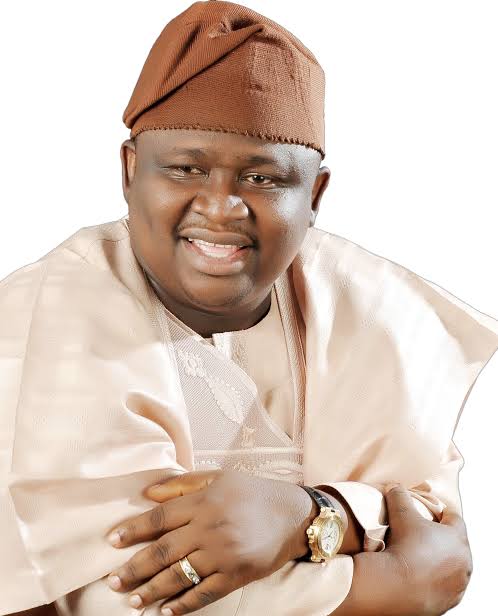Legislature
Senate to deliberate on Diaspora Voting this Week, says Bamidele

As part of the ongoing review of the Constitution of the Federal Republic of Nigeria, 1999, the senate will deliberate the diaspora voting rights this week, the Leader of the Senate, Senator Opeyemi Bamidele has disclosed.
He gave the indication at a virtual diaspora dialogue at the weekend, saying that it is the resolve of the National Assembly to reconsider the diaspora voting rights and other related issues affecting Nigeria in the diaspora.
The dialogue was organised by the Directorate of Diaspora and International Affairs, Office of the Senate Leader in collaboration with Engage Diaspora Foundation and Nigeria Diaspora Foundation.
Fortnight ago, the senate leader sponsored a motion aimed at reviewing the Constitution of the Federal Republic of Nigeria, 1999.
But at the dialogue on Sunday, Bamidele justified the resolve of the National Assembly to review the 1999 Constitution, saying the diaspora voting rights would form part of the ongoing constitution review.
He said: “Let me tell you some good news. Not that we are trying to bring the bill back, the bill is already on the floor of the 10th Senate. Exactly two weeks ago, we had the first reading of the bill. It has already been scheduled for second reading.
“Definitely, as the Leader of the Senate, I can assure you that we will consider the second reading of the bill this week. After this stage, it will be referred to the Senate Committee on the Review of the 1999 Constitution.
“As it presently is, the constitution review committee is chaired by the Deputy President of the Senate. As the leader of the Senate, I am the Vice Chairman. You can be rest assured that I am with you in this effort.
“I see this fight as a generational fight. It is about your children. It is also about ensuring greater inclusion in our electoral process. We cannot be interested in what is coming from you, but deny your right to vote.
“Diaspora voting is a right that must be recognised in the Constitution of the Federal Republic of Nigeria. After the passage of the bill, it will be taken to the House of Representatives for concurrence,” the senate leader explained at the virtual diaspora dialogue.
After the concurrence by the House of Representatives, the senate leader explained that the bill would be transmitted to the State Houses of Assembly and two-thirds of the 36 State Houses of Assembly must approve to become effective.
Bamidele, therefore, challenged the stakeholders to engage governors of the 36 states of the federation and Speakers of the State Houses of Assembly to ensure the passage of the bill into law.
Also, at the dialogue, the Director of Diaspora and International Affairs, Office of the Senate Leader, Ms. Shade Adepeju-Joseph said the time was now ripe when diaspora matters should take a centre stage in all meaningful conversations on national progress and development.
Adepeju-Joseph noted that such conversations should be centred mostly on diaspora voting and the prospect of legislative intervention in bringing it to reality.
Legislature
Senate passes for second reading Bill to document, protect domestic workers, employers

The senate on Wednesday passed for second reading a Bill meant to document, protect domestic workers and their employers
This came after the general principles of the bill was presented by the sponsor Sen.Hussaini Babangida (PDP Jigawa) at plenary.
Titled, the bill for an act to provide for the documentation and protection of domestic workers and employees and for other matters there with Babangida in his presentation said the bill was read the first time on Nov 21, 2023.
“The intendment of the bill actually is to raise the issue of the employment, regulation and the management of domestic workers on one hand and on the other hand to deal with the matter of rights of also employers from domestic workers.
“So it is a two way bill that seeks to address the regulation and the operation in the informal sector of the economy.
“Let me just go back to history. In 1998 it was widely reported about a senior flight officer Hadiza Oboh of the Nigerian Airways at the age of 39 who was almost approaching the position of a captain, she was highly celebral. She was murdered by her employees and domestic workers as reported, till date the culprits have not been apprehended because record has it that they are workers from Togo/Benin Republic that she employed who killed her.
“There are a lot of cases of atrocities committed by our domestic workers.
On the part of the employers, there are reports of cases of employers maltreatment including harassment and sometimes killing of workers in their employ.
“Therefore the intendment of the bill is to bring the two sides together so that we can have a harmonized and regulated documented and properly articulated approach to Domestic employee/employer relationship. “It is also know that most of the people we employ we hardly ever know them
“You hire a gate man, you don’t know his history, you don’t know his genealogy, you don’t know his background and no any record of him so If there is any issue you will not be able to trace him. Cases of kidnapping, burglary, house theft rubbery are the result of internal collusion between the domestic staff and outsiders
According to him, over the years, there has been an increase in the incidents of assaults and abuse of domestic workers by their employers or hosts.
According to him, the abuses ranged from slave labour, physical abuse and sexual abuse among others.
He said some times ,the stories are gory, traumatic and mind-boggling, especially against the background that the domestic workers exist in the informal sector.
“They are unionists and they do not have a collective platform to speak for themselves and therefore remain ostensibly vulnerable and helpless.
“On the other side of the coin, is the rise in the state of complicity of crimes committed by domestic workers mostly in connivance with other criminal elements of society against their employers or host.
“These bother on burglary, kidnapping, stealing of children, and sometimes outright murder.”
He said due to urbanization, fast growing cities with chaotic traffic in Nigeria such as Port Harcourt, Lagos, Abuja, Kano and other cities have put significant pressure on working class parents of different categories of the society.
This, he said was compelling many of them to spend more time at work places and far less time at home.
“The concomitant effect of this is that many families, from the low, middle, to the high- income class families have come to the inevitable reality of the necessity of employing and relying on domestic workers to attend to their needs at home.
“It is saddening to note that a very vulnerable group of this category of domestic workers have been consistently played upon by their employers or hosts.
“These are mostly house maids, boys, wards and extended family members.
“A lot of these workers are unregistered and not supported by most national labour laws, They work for private households usually without clear terms of employment, particularly in our country.”
He said Nigeria was yet to have a codified legislation that provides for the right of domestic workers.
He said it was therefore imperative and critical for the 10th Senate to urgently assist the law enforcement agencies with potent legislative interventions by passing the bill.
“Mr. President, distinguished colleagues, in view of the enormous benefits of this bill which has been elaborately deliberated in this lead debate.
“All of you know one house girl, mechanic, one driver, somebody somewhere who needs our help in this chamber.
“I want to urge you to support the second reading of this bill, he said.
The bill, which received support of lawmakers was referred to Committee on Labour and Productivity for further legislative inputs by President of Senate, Godswill Akpabio after it scaled second reading.
The bill is to be brought back to plenary in four week
Legislature
Bill to amend 59 Year-Old ICAN Act scales second reading

A bill meant to amend the 59 Year-old Institute of Chattered Accountants of Nigeria (ICAN) Act CAP 15, 1965 on Tuesday scaled the second reading at the senate.
When passed, the act will empower the Institute to set standards and regulate the practice of Accountancy in Nigeria.
The proposed legislation, among others, is seeking to increase fines payable by a member upon a conviction on indictment from N1,000 to N500, 000.00 (N.5m)
The Chairman, Senate Committee on Appropriation, Senator Solomon Adeola, who sponsored the bill, decried the lack of review of the Act that has been hampering the activities of accountants over the years.
He explained that the current ICAN Act, came into effect on September 1, 1965, some 59 years ago.
The lawmaker explained that in line with the dynamics of the environment, the downturn in the economy and changing needs of chartered accountants over the years, it has become expedient and instructive to amend certain provisions of this Act.
He also reiterated the need to insert new provisions to bring the Act up to current realities and ensure that ICAN remains adaptive, forward-thinking, and attuned to the needs of our nation.
Adeola said, “A total of 26 amendments/ insertions are contained in the proposed amendment of the Act affecting sections and subsections of the Act as well as the Schedules of the Act as set forth below with rationale to guide this debate and allow its passage for second reading.
“There is a need to situate accounting practice to encompass developments since 1965 and to bring the practice to what obtains in other jurisdictions, hence the need to amend Section 1,14, 19 and inserting a new section 15.
“All the sections deal with issues of accounting practice and all areas that a chartered accountant is entitled to practice under the Act.
“Corporate governance of modern professional accountancy organisations has evolved, hence the need to amend parts of Sections 2, 3 and 6 and inserting new Sections 24 to 26.
“For instance, Section 3 of the Act is proposed for amendment because the Council of ICAN started off with a twenty-member structure in 1965 when membership was just 250.
“The number was increased to twenty-five subsequently in accordance with the provisions of the Act. With membership strength of over 53,000 today, the need to increase the membership of the Council to 36 has become compelling.
“Additionally, the amendment aims to strengthen ICAN’s collaboration with other professional bodies and regulatory authorities, both at home and abroad.”
Adeola added that such collaborations would foster synergy, knowledge exchange, and harmonization of standards, guaranteeing that Nigerian chartered accountants remain at par with global best practices and their global counterparts.
He argued that there was a need to enhance the capacity of the institute to carry out its mandate in the area of regulation and compliance.
The Senator said, “This has necessitated the need to amend sections 7, 8,11,12, 16, 18, 20 and 21.
“A glaring example for amendment is Section 18(5). In the 59 years old Act, a proven infraction on summary conviction of any of the offenses attracts a paltry N100 fine while a conviction on indictment attracts only a fine of N1,000.
An observation of a copy of the bill indicated that the the senator proposed that the N1,000 be increased to N500,000.00.
Adeola said, “You will agree with me that these sanctions for offenses that could lead to loss of millions or billions of naira, is not a deterrent to malpractices.”
“These amendments collectively aim to strengthen the legislative framework, expand the Institute’s structure, and enhance regulatory powers and professional integrity within the accountancy profession as in other jurisdictions of the world and global best practice.”
Senators who contributed to the debate agreed that the amendments to the 59 Year-old ICAN Act would improve the operations of the accountants in the country.
Legislature
Senate pushes for the completion of Wudil-Gaya-Duste dual carriage way

The senate on Tuesday Mandated its Committee of Works to interface with the Minister of Works, to expedite the completion of Wudil-Gaya-Duste Dual Carriage Road.
The resolution was reached following a motion on urgent need to expedite the completion of Wudil-Gaya-Duste Dual Carriage Road on Kano Maiduguri Road Sponsored by Sen. Kawu, Suleiman Abdulrahman (Kano South)
The Senator in his lead debate noted that the Kano-Maiduguri expressway which is a critical artery for transporting people and agricultural goods across several states including Jigawa, Bauchi, Yobe, and Borno, was awarded a dualization contract by the federal government 17 years ago under Chief Olusegun Obasanjo’s administration.
However, he observed that successive administrations have failed to complete the vital project
According to him, in 2018, the President Buhari-led administration’s commitment to improving road transportation led to the award of so many road contracts to restore many of the dilapidated roads in the country. Among these projects was the renewed contract for the dualization of the Kano-Maiduguri Road
“Aware that a major transportation upgrade is on the horizon! A brand new two-lane highway will be built, along with improvements to the existing road. To tackle this ambitious project, it’s been divided into five manageable sections.
“The first section focuses on the Kano-Wudil-Shuarin Road, while subsequent sections cover progressively connect Shuarin to Azare, Azare to Potiskum, Potiskum to Maiduguri, and finally, Maiduguri to Benishek.”
He said one of the section was the most extensive, spanning roughly 202.73 kilometers.
He said as an international route linking Nigeria to Chad, Niger, and Cameroon, the Kano-Maiduguri road facilitates cross-border trade.
According to him, Dantata and Sawoe Construction Company Nigeria Limited was awarded the contract for section one of the road, saying that despite initial work, the project appears to be behind schedule.
“Worried that the unfinished section between Wudil and Gaya in Kano state is particularly dangerous.
“One lane of the planned dual carriageway is complete, forcing drivers to navigate a single lane in both directions,this significantly increases the risk of accidents.”
He expressed worry that the unfinished section between Wudil and Gaya in Kano state poses grave danger to commuters.
He said the only one lane completed on a planned two-lane road, forces vehicles traveling in both directions to navigate a single lane.
“This is a recipe for disaster, and immediate action is required to finish construction and ensure driver safety,”he
-

 Crime6 months ago
Crime6 months agoPolice nabs Killer of Varsity Lecturer in Niger
-

 News3 months ago
News3 months agoFCT-IRS tells socialite Aisha Achimugu not to forget to file her annual returns
-

 Appointment8 months ago
Appointment8 months agoTinubu names El-Rufai, Tope Fasua, others in New appointments
-

 News From Kogi6 months ago
News From Kogi6 months agoINEC cancells election in 67 polling units in Ogori-Magongo in Kogi
-

 News7 months ago
News7 months agoIPOB: Simon Ekpa gives reason for seperatists clamour for Biafra
-

 News From Kogi8 months ago
News From Kogi8 months agoEchocho Challenges Tribunal Judgment ordering rerun in 94 polling units
-

 Metro2 months ago
Metro2 months ago‘Listing Simon Ekpa among wanted persons by Nigeria military is rascality, intimidation’
-

 News4 months ago
News4 months agoKingmakers of Igu/ Koton-Karfe dare Bello, urge him to reverse deposition of Ohimege-Igu

